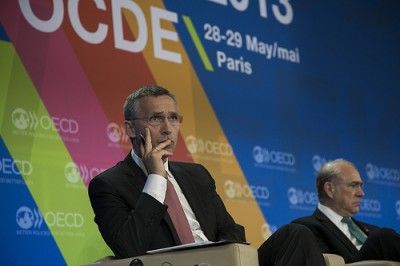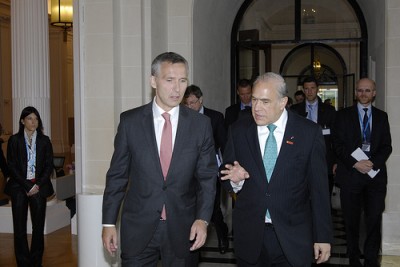Norwegian Prime Minister Jens Stoltenberg got plenty of attention at the prestigious OECD ministerial meeting in Paris this week. Norway’s strong economy is envied by his hard-pressed colleagues in Europe, and Stoltenberg seemed to feel a need to downplay his own country’s good fortunes.

He repeated, for example, statements he’s made since the global finance and debt crises began four years ago, that Norway is far from immune to the problems facing other countries. The severe recessions, massive government budget cuts and alarmingly high unemployment in the euro zone is a threat to Norway’s economy, since the EU is Norway’s largest trading partner. Norway itself registered a rise in its unemployment rate during the first few months of this year, and Stoltenberg wasn’t surprised. Growth has been good and will continue, he predicted when making the keynote address at the OECD (Organisation for Economic Cooperation and Development) on Wednesday, but Norway’s oil wealth poses challenges as well.
“The challenge in Europe is that (some individual countries) have used money they didn’t have,” Stoltenberg said. Norway, meanwhile, needs to avoid using all the oil revenues it’s generating every day, to make sure the country’s economy doesn’t overheat. “That’s also a challenge,” he said.

The coalition government that Stoltenberg and his Labour Party leads is running for re-election to a third term this fall, so he needs to stay optimistic and lay claim to all the sound management of Norway’s economy that he can. When addressing the OECD crowd, which is made up of 34 countries representing the world’s largest economies, he needed to temper his comments to avoid reinforcing the impression that Norway is an economic paradise.
As newspaper Aftenposten reported, Stoltenberg noted that Norway doesn’t spend any of the oil revenues that constantly flow into the state treasury. Rather, the state budget can only use the average estimated annual return on the so-called “Oil Fund” where the revenues are stashed for future generations. Right now the estimated return is set at 4 percent of the size of the fund, although Stoltenberg’s government is currently spending even less than that and some economists think that’s too much as well. The International Monetary Fund (IMF) advised Norway this week that its 4 percent-rule (known as handlingsregelen) is too high, because long-term returns on the fund are likely to be lower.
Stoltenberg and his finance minister, Sigbjørn Johnsen, are under constant pressure at home to spend more of the oil revenues on improving roads, schools, health care and other major government services. One of the main opposition parties, the conservative Progress Party (Fremskrittspartiet, Frp), wants to spend much more of the oil revenues than the socialist parties, arguing that it’s better to invest in Norwegian infrastructure and services than in foreign stock markets. Many Norwegians feel the same, although cautious use of the country’s wealth has consistently prevailed so far.
‘Much nicer’ challenges
Despite Stoltenberg’s efforts to get across the message that Norway has its economic challenges as well, OECD secretary general Angel Gurria commented that Norway’s “challenges” are much nicer than those facing so many other OECD members. OECD economists themselves predicted more economic growth for Norway in 2013 and 2014, more relatively low unemployment and better performance by the non-oil sector, often referred to as the “mainland economy” in Norway as opposed to the overall economy that’s dominated by offshore oil and gas activity.
Inflation in Norway may rise next year, along with interest rates, predicted the OECD, while high housing prices will keep rising regardless. Stoltenberg stressed that oil revenues don’t necessarily mean the good times will keep rolling.
“We had oil revenues back in the 1990s when we had a bank crisis, a finance crisis, a housing crisis and high unemployment,” Stoltenberg told the packed OECD conference hall. “Oil gives us advantages, but it’s no guarantee.”
He had some advice of his own for the crowd, urging OECD countries to strengthen their international cooperation in closing tax loopholes that have allowed multinational companies to avoid paying tax. Stoltenberg also urged programs to ease sky-high unemployment in Europe, especially among the young.
Views and News from Norway/Nina Berglund
Please support our news service. Readers in Norway can use our donor account. Our international readers can click on our “Donate” button:

